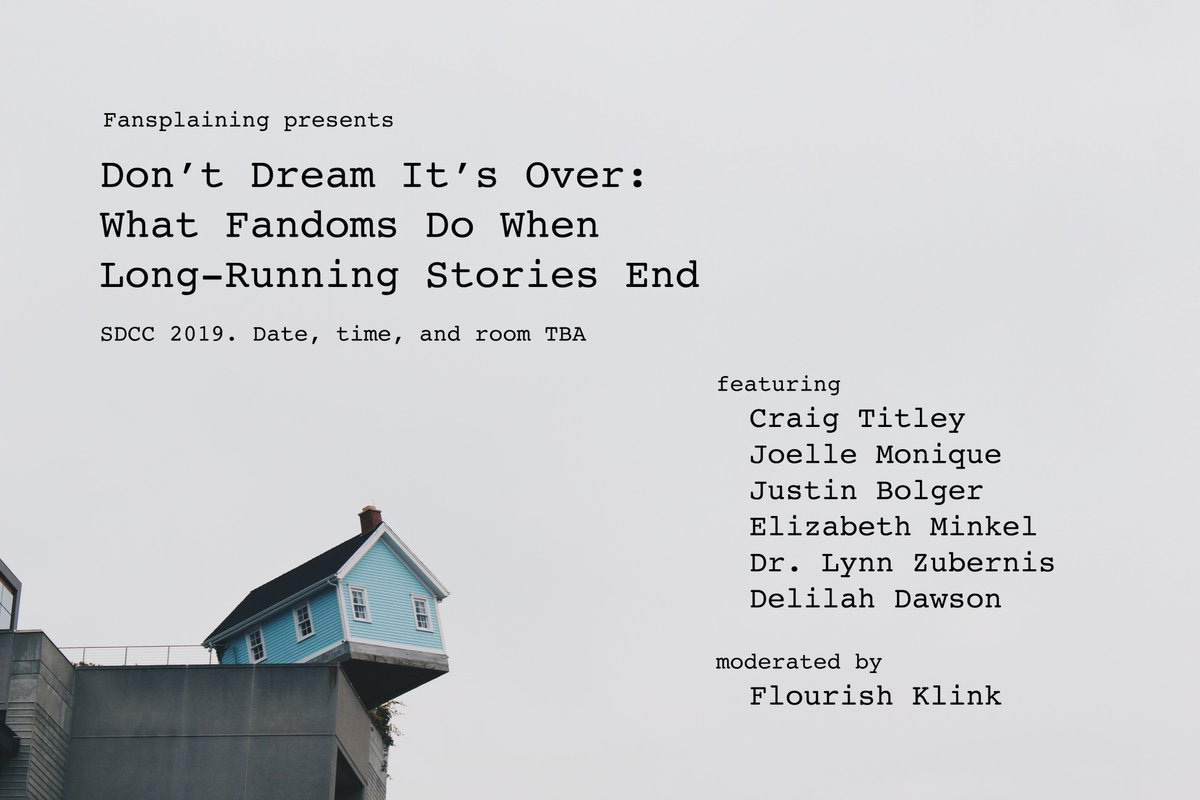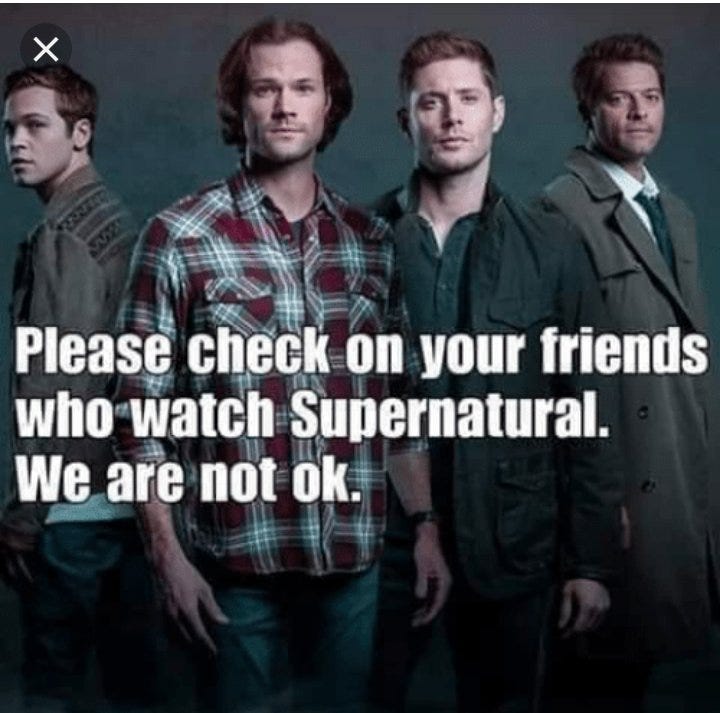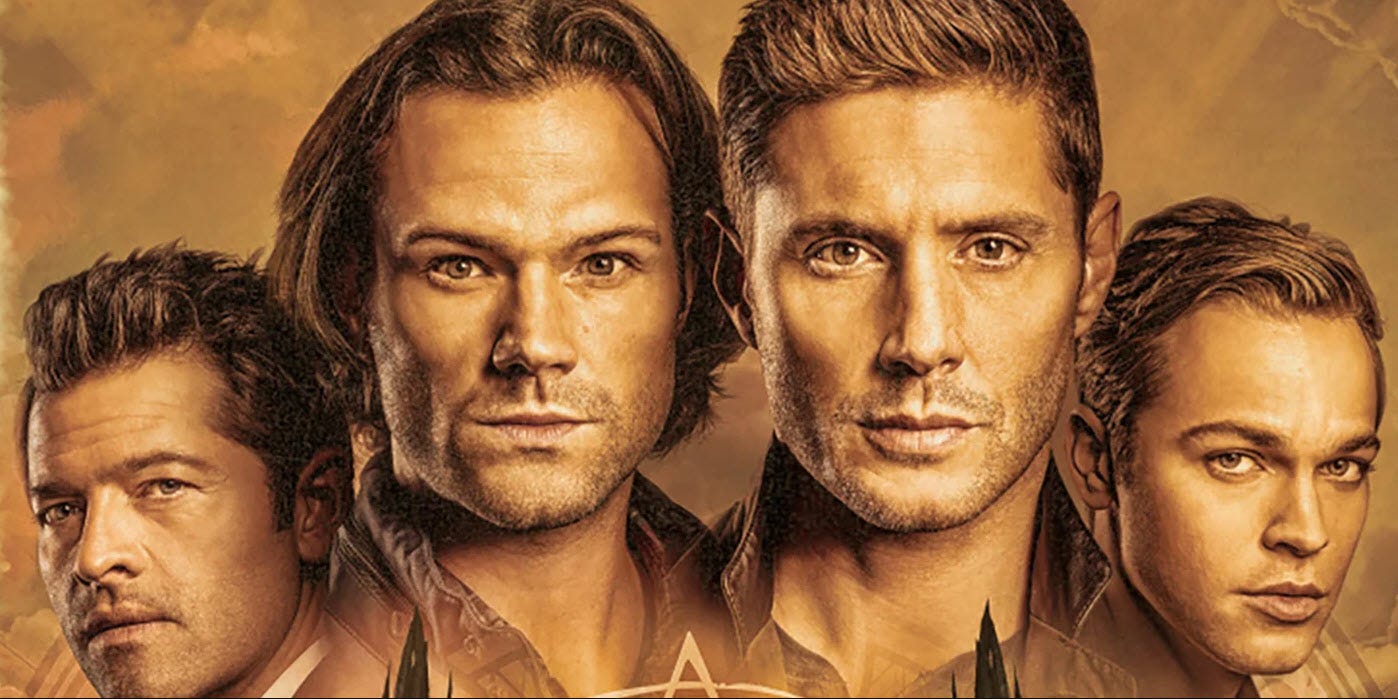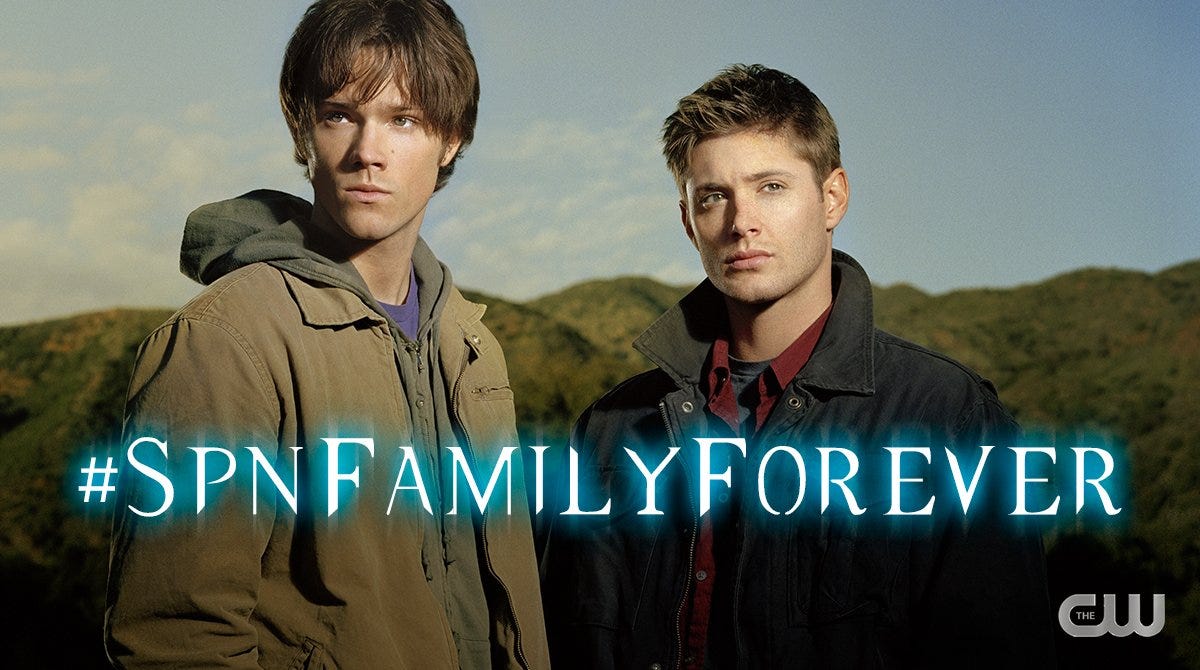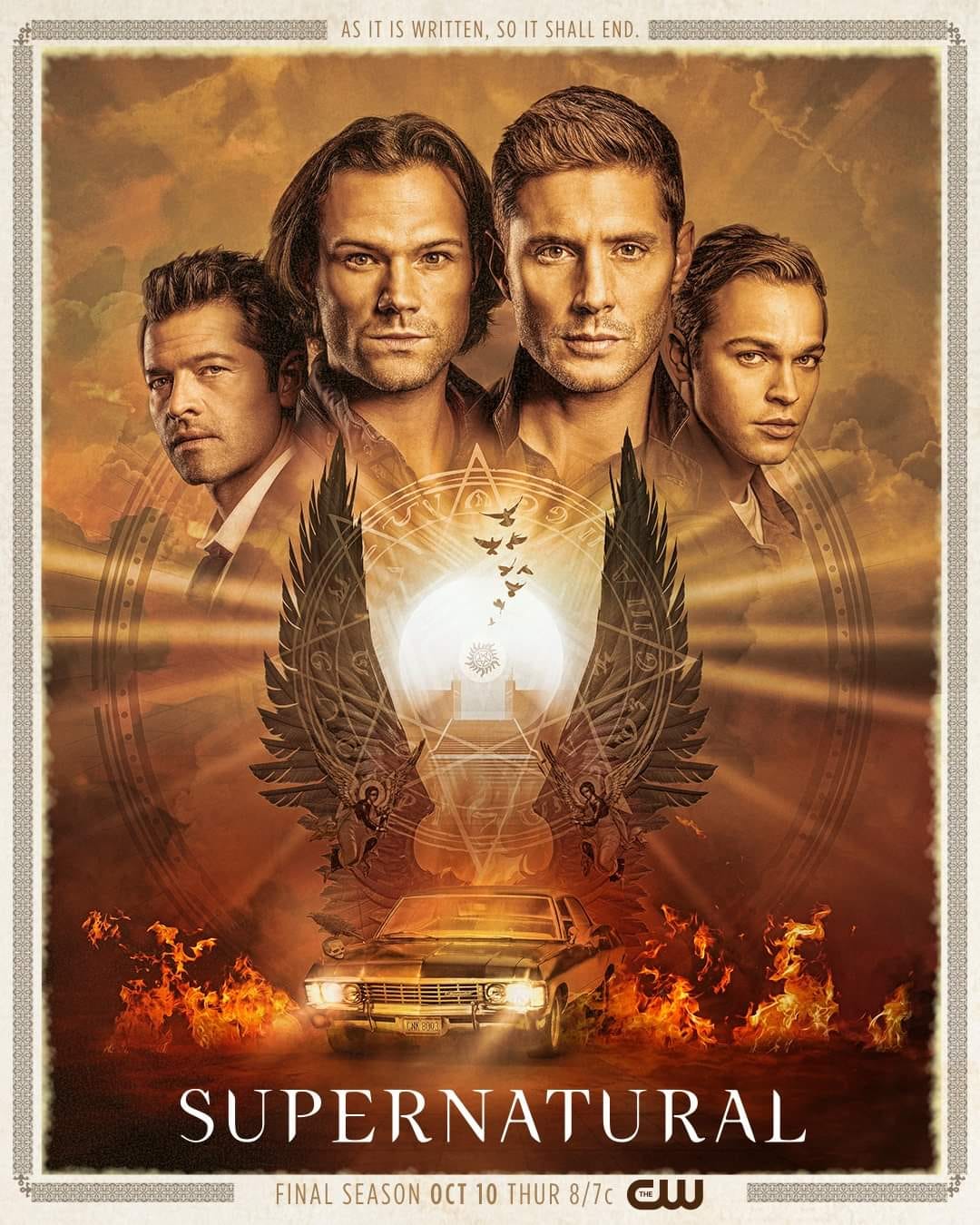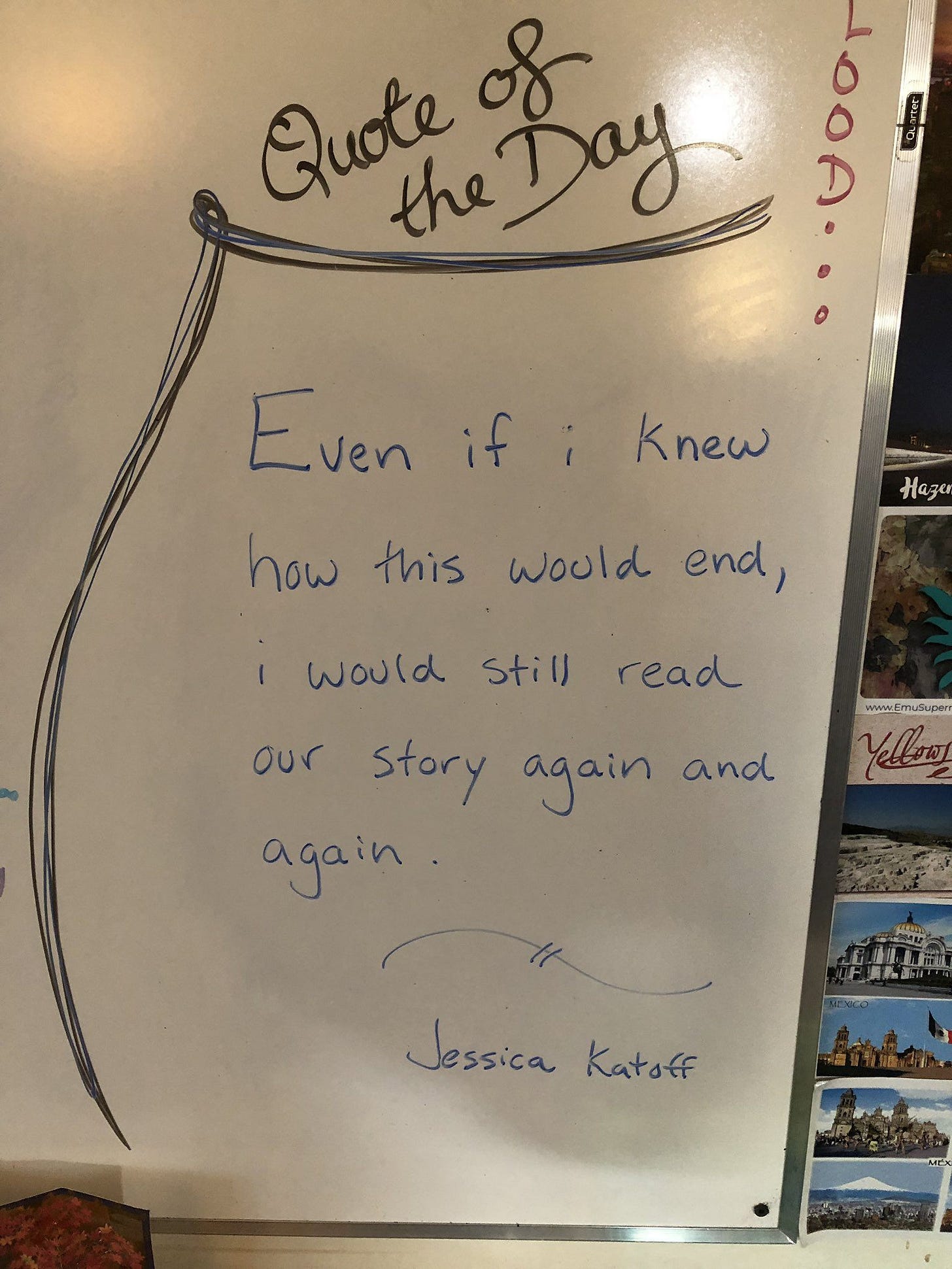‘Supernatural’ Final Season: What Fandoms Do When Long-Running Stories End
Click to read the full story: ‘Supernatural’ Final Season: What Fandoms Do When Long-Running Stories End
This year’s Comic-Con in San Diego was notable for being the last visit for many long-running television shows and film franchises. Fans are understandably struggling with the things they love coming to an end, or with the endings that have already happened that left fans less than satisfied (“Game of Thrones,” I’m looking at you…)
In an effort to give fans some ways to cope with the whole idea of endings, the podcasters at Fansplaining (@Fansplaining on twitter) put together a panel of creatives and fandom journalists, and I was excited to be one of them. There’s really nothing like doing a panel at the biggest fan convention in the country – and yes, I save my name card every single time. This panel, for me, was also personal – my own beloved favorite show, “Supernatural”, is going into its fifteenth and final season. So, let’s just say I needed the panel for myself too! (As does the entire “Supernatural” fandom)
I was joined by Craig Titley, a writer on another show coming to an end, “Marvel’s Agents of SHIELD;” Justin Bolger, who has handled social media for the “Star Wars” franchise; Joelle Monique, film critic and passionate “Game of Thrones” fan; Delilah Dawson, author of tie-in novels from some fan-favorite series; and Elizabeth Minkel, co-host of Fansplaining. Our moderator was Fansplaining’s other cohost, Flourish Klink (who did an amazing job wrangling all of us).
Flourish kicked off the panel by asking what fans can do in response to the news that a favorite show is ending. Do fan petitions help? Save the show campaigns? Lots of tweeting?
Craig: Well, in this case, Agents of SHIELD ended it on their own terms and ended it where they wanted to, so the show wasn’t going to be coming back.
Craig encouraged fans to show their support for follow-up projects, though, such as a proposed comic book based on the series and the characters.
Craig: It sounds crass to say “buy it,” but that’s how The Powers That Be see support. You can also write letters and be active on social media to say “we miss Agents of SHIELD, what can be done to keep the stories and the characters alive?”
So, for those keeping score, coping strategy No. 1:
Consume and communicate and encourage TPTB to keep the characters you love alive in some form.
Justin Bolger, who handled social media for “Star Wars,” commented on what was helpful and not helpful in terms of getting more of that thing you want so badly.
Justin: Social media is a microcosm of the world around us, but people behave differently [because online interaction is anonymous]. It’s suddenly real when you come to a convention and see people face to face. When you interact in person it changes the dynamic, but I try to be that same person on social media.
That was a pretty good recommendation, I thought, for all social media interaction.
Justin: Be yourself, but don’t make it seem like you’re the only person who matters when you interact on social media. If you hate Captain America, and someone is cosplaying as Captain America, why would you call them out online and say you hate something that someone else is getting joy from?
We all agreed with him – let other fans love what they love.
Justin: Star Trek has a saying that I love – IDIC. Infinite diversity in infinite combinations. I think that’s a great rule to live by, in real life and online.
Coping strategy No. 2:
Positivity works better than negativity when you’re interacting with both fans and creators.
Flourish asked the panel whether a fan petition that is very negative make it less likely that the things fans are demanding will actually happen.
Justin: It sounds crass to say buy it, but always keep in mind that it’s a business. If you have that perspective, you can go in open hearted but clear eyed. The best way to support it is, because it’s a business – with your money. Don’t be taken advantage of, but you can support the project and then people will see the value in it.
Flourish then asked me about that kind of negativity in fandom, noting that it’s unfortunately fairly common in my own fandom for “Supernatural”.
Lynn: Unfortunately, you can’t have passion in a positive direction and expect not to have passion that sometimes goes in a negative direction. This is an emotional experience for fans, because what you’re a fan of is important. If you’re a fan, that’s part of your identity. You relate to the characters you fan and that’s part of how you figure out who you are, either by identifying with the stories or the characters, or by writing fanfiction or cosplaying or whatever. And the community aspect is also really important – back in the day, in an evolutionary sense, nothing more terrifying than the threat of the group we belonged to being taken away. So when we’re faced with the ending of something important to us, it’s a loss, and we humans don’t do very well with those, especially disenfranchised losses. A disenfranchised loss is one that’s hard to work through because it’s not recognized by the people around you. So you can say to your partner or family or coworkers “OMG I’m so depressed that “Supernatural” is ending” and they might come back and say “Hey get a grip, it’s just a television show”. But it’s more than that to fans, and it is important.
Coping strategy No. 3:
Allow yourself to grieve, and find a community of people who won’t dismiss that grief or disenfranchise your legitimate loss. It’s okay to be sad.
Flourish: Joelle, so many people were upset by the ending of Game of Thrones – how do you deal with something you love so much coming to an end?
Joelle: A lot of people wanted to lash out at the creators. As a film critic, I don’t think that’s appropriate. I tend to treat everything by remembering that they intended to make something that was really great, I don’t think anyone goes “I hate these fans, let’s burn them.” {When that doesn’t work}, my outlet has been fanfic.
Everyone on the panel and in the room: (cheers for fanfic)
Joelle: Fanfic is a self gratifying way of engaging in the content that you want, and you can key search the outcomes that you want and the relationships that you want. Maybe you hated Season 4 but Season 2 was your bread and butter, so you can go in and relive just those parts. My head canon for Harley Quinn could not be further from what’s on the page, because my introduction was from fanfic. Fans won’t always get what they want from the shows we love, but we can turn to one another and get really great stories that become perhaps even more important than the original.
So, coping strategy No. 4:
Fanfic! Write more of that content you so desperately want or read what other fans are writing to keep that world alive.
Delilah: I’m an 80s kid, so I got to watch lots of the things I loved go dormant and then like a cicada rise 17 years later.
Everyone: That’s so true.
Delilah: Labyrynth, My Little Pony, Dark Crystal, it’s amazing. What I do is official canon in these worlds, so I don’t get to say what I write as much. When Firefly comes to me, they don’t say what do you want to do, they say do this. Or Star Wars. Things not to do? Reach out in ways that don’t harm up and coming creators. They might be doing what they’re told to do also. In general, [people who are creating canon] respect the fans and want them to be happy.
That’s coping strategy No. 2 again.
Flourish: Is there a difference between getting canonical extensions of things we love versus getting fanfic extensions?
Elizabeth: There is. The world of transformative works and fanfiction is vast and can focus on different stuff. For example, there are people still bringing people into Inception fandom with their creative works and there’s probably never going to be another Inception. [If you’re a big Inception fan, so sorry}. On Fansplaining, we just surveyed people about shipping and got close to 17,000 responses, and more than half said they shipped things that they weren’t even familiar with the source material for! Sometimes the canon material doesn’t really matter that much, fans are doing their own thing.
Coping strategy reiterated:
Read and write more fanfic!
Flourish asked if Craig sees much of the fan-to-fan communication and creative work from the creative side.
Craig: I don’t really see the fan to fan communication. Our fans are generally nice and go with where we take them. But I try to stay away [from things like reading fanfic and fan conversation] because I feel like I serve the fans best if I just do what I’ve been doing and writing the characters and not getting anything else in our heads. People like our characters for a reason and will continue to if we continue to honor that. So it’s not a disrespect for fans, it’s the opposite.
Talk then turned to the relationship between fans and the creative/production side, and the tensions that are sometimes there.
Flourish: Is there a tension between fans saying show your support and tweet at the creators and the way that, say “Supernatural” has courted fan conversation and maybe used that to justify staying on the air? Is there a tension there?
Lynn: There is. Like Elizabeth, I came into fandom through the transformative works door, through fanfiction, so I fell in love with the show and the fanfic and the community at the same time. In the beginning there was a real dividing line between the fan works and the canon and that made for a different sort of interaction between fans and creators. Canon was canon and nobody expected it to be influenced by what fans were writing or imagining, so that kept a lot of tension out of it. Now there’s more perception of reciprocity but there’s also sometimes a misconception on the part of fans thinking that what you’re tweeting to a writer or showrunner is gonna turn the show around. I think Eric Kripke said to me once that making a change to a show like “Supernatural” is like turning around the Titanic. You can’t just say oh fans didn’t like that, next week we’ll do something completely different.
Joelle: I love “Supernatural” fandom, speaking of that tension between fans and creators. I love that the creators have been like, “well y’all wanna ship the brothers, okay, we’re just gonna comment on it in the show then!” That episode of “Supernatural” was life changing for me as a fan to be like oh, there is a way that we can engage the creators and the creators can engage with that by teasing it, and nobody expected it to happen in canon. With the advent of social media, there are ways to communicate that don’t disrupt the show and aren’t necessarily negative but acknowledge the two parties.
Justin: Something that has also increased the tension is how easy fans can make it look [to make some of these films and shows], by making a film or a fan video with good production values, and they can market it as being equal to what others are spending millions on to make. So fans are like “why can’t you do it for that amount?” All of them are labors of love but they have different purposes. J. Michael Straczynski, I think it was him, once said that all stories exist for a reason but they don’t all exist for the same reason. A fan uses their own money to make that for love, the company makes it to make money. But it causes fans to be like, why can’t you just make it in the way I like?
Joelle: It’s not the place of a fan to direct the show, especially because you have so many places you can [direct the story]. You can write your own stories.
Flourish: If something has been off the air for a long time, people do want more stories that are canonical. Like with Firefly. What do you think about the process of asking for that, like a petition – what’s useful? Or when should creators just say go make your own thing?
Craig: When a series ends and there’s no plan to continue, make fanfiction. And then someone on the corporate side might say oh hey maybe we should start making comics or books because it seems like people still really like this. I still don’t understand why there hasn’t been more Firefly because fans love it. There was a mob scene a few years ago when the cast got back together.
Delilah: I think of canon as history so I haven’t delved into fanfiction. What was made is what was given and gifted to us, as I see it. I know there’s a secret and amazing world of what people are doing out there but I have trouble going there because, history. Sometimes I know that what I’d ask for isn’t always what I want to receive too.
Joelle: I think sometimes we need to be surprised too. If we were always given what we wanted, we’d quickly become disappointed. What’s great about going into a new Star Wars film is like, what’s gonna happen? There’s also an opportunity when a show has ended for fans to then go into the themes that were restricted elsewhere [in canon]. Like Avatar The Last Airbender had LGBTQ themes but it was on Nickelodeon and they didn’t want a million moms calling and complaining.
Another vote for coping through fanfiction and other fan works.
Justin: The other opportunity when a show ends is to go back in and watch it again and look at it differently and to repeat that process as many times as you can depending on how much you love the show. I love Kings, it has only 13 episodes, and I can’t tell you how many times I’ve watched those 13 episodes. If you love a story that much, it follows you through your life.
Everyone: {Nodding in agreement}
Justin: And we bring our entire lives with us when we go to see a movie. The cool part about that is you see that movie at 15, then when you go back in you see it through completely different eyes. There’s a wealth of content that made you fall in love in the first place and you can go back in and mine it in a completely different way. To refer back to the title of this panel, just because it ends doesn’t mean it’s over.
Coping strategy No. 5:
Do a rewatch! Or multiple rewatches.
Lynn: It’s interesting that you say that about rewatching giving you a different perspective, because this summer a bunch of us are doing a rewatch of the entire series since “Supernatural” is ending.
Everyone: THE ENTIRE FOURTEEN SEASONS??
Lynn: I’m very tired… (laughing). It’s a lot, but what I wasn’t expecting is that my life was really different 14 years ago, I was a different person. So I’m seeing all these episodes that I loved the first time but I’m seeing them really differently now. So I think you’re right, you can go back and rewatch and keep pulling different things out of it, and that’s a great way to hang onto those characters you love. But I also think there is a real longing in fans for having more of the canon, more of the story. You don’t want to let the characters go. I don’t want to only know what Sam Winchester was like at 37. I want to know what he’s like at 50 too, and I’m probably not gonna get that but there’s a longing for that. I think it’s two separate things.
Justin: I agree.
Elizabeth: I don’t agree at all.
Flourish: Oooh, Fight fight!
Elizabeth: That sort of presupposes that fans want one thing out of “canon”. People often write fanfiction because they want an emotional reboot or some sort of continuation and more canon may not give you that because they didn’t give you that in the first place. And a reboot may not give you that community that you want either, people move on and move to different fandoms. So I think there’s more to it than wanting more content from the gods on high. And some people just want validation of their own ideas. Like Good Omens fandom tweeting their head canons to Neil Gaiman and he just says yeah, you’re all right.
Lynn: We’re not gonna fight because I don’t disagree.
Elizabeth: I wasn’t disagreeing with you!
Joelle: I think it’s about engagement. For me all fandom centers on culture, on community. Seeing people come into themselves or maybe come out in fandom. Harry Potter was really all about chosen family, these themes keep repeating no matter who you’re shipping and link all of us back into fandom.
Flourish asked about the idea of migratory fandoms, and how that could be a coping strategy too – you get into something and then everyone decamps and gets into the next thing.
Lynn: Nope.
Flourish: Oh right, Lynn you’re like no, it’s “Supernatural” for the rest of my life!
Lynn: Yep.
Flourish: But does that play a role in coping, taking that fandom community with you to the next thing?
Joelle: For my Game of Thrones fandom, there will be a small core group post GoT that will be like where are we getting our fix next? I don’t think we’ll get that same kind of juice from a streaming show, though, like a watch it every Sunday and then go online and talk about it thing. I don’t know if we’ll ever have that again, but I want it, that would be sad if we didn’t. I want another show that we can get together on Sunday night, another show that is that rich, because those are vital moments for those of us who are loners and weirdos — proudly — who love our fandom community. What makes fandom exciting is because there are people living the stories. It’s crazy that there can be part of you that’s still living through something that no longer exists. It’s like Frankenstein.
Coping strategy No. 6:
Take your fan community with you to the next thing and hope that it provides the same satisfaction (Unless you’re like Lynn and just want to love “Supernatural” forever).
The panel then took a few questions from the audience of gathered fans.
Fan: Thinking about what Lynn said about disenfranchised grief and what Elizabeth said about using fandom to process your grief after a show ends, what would it look like for TPTB to coach a fandom through the ending? Would that be helpful?
Elizabeth: But is there a way to do that when the studios and content creators are already moving on to the next project? Hashtag capitalism. Do corporations actually care what fans think? There’s no more money to be made out of it for them at that point.
Everyone was fairly skeptical about that, but I have to say (though I didn’t get a chance to share this on the panel) that I think the cast of “Supernatural” and even the studio are doing their best to ease the transition for fans as get ready to say goodbye. Jared Padalecki, Jensen Ackles and Misha Collins insisted on telling fans right after they told their long-time crew, recording an emotional video so there wouldn’t be any misunderstandings or rumors flying. They’ve talked about the show’s ending at conventions and in interviews, and directly on social media. This September 13, the fourteenth anniversary of the airing of the show’s pilot, cast members past and present went online to express their gratitude. The studio started a hashtag, #SPNFamilyForever, that trended on Twitter.
They also released the promotional poster for the final season on that day, with the words “As it is written, so it shall end” hovering forebodingly above and both hell and a stairway to heaven depicted along with the Winchester’s beloved “Baby”.
The actors have even written a book about what being on the Show and the fandom have meant to them (Family Don’t End With Blood). They understand how much these characters have meant to fans and don’t take that lightly, and I think knowing that they too are grieving makes the upcoming end a little easier to take. The acknowledgement, by the actors and the studio, that this ending is important feels validating to the fans who will be enduring that loss.
Justin: My marketing philosophy is about what Joelle said — an experience, a sense of community built over time for a show. Not to be cynical but people don’t buy the object, they buy the feeling. So could TPTB ever find a way to care enough to want to provide that? I think the community exists and is hungry to continue having that feeling, so the merchandise will continue to sell long after the show is over. There may be spinoffs. Every property is a gold mine that you can go back to in order to make more money but a lot of corporations don’t understand that there’s a more modern mindset, that helping that community enhance that feeling, you could make a lot of money while still helping fans.
Fan: Why do they mess things up? I mean, Sonic the Hedgehog, I don’t know how they messed it up but they did, and fans took it into their own hands and called out something – I mean, they had a reference.
Joelle: [And they changed it]. I have a lot of feelings about that. It feels like a cash grab, not something that came out of the fandom. But I think we as fans have to take a step back from this feeling of this isn’t what I expected or wanted to see. That’s 6000 animators having to go back and make changes, they already don’t get paid that well. It’s a huge overhaul for a film I don’t think we’re gonna like that much anyway. We need to be responsible because we can talk to these people directly. If we can engage the people not at the top and thank them for their work and be understanding, that helps all of us.
Fan: Sometimes fans need to rescue the content from creators that don’t get it. If they make something the fans don’t buy, they have to retool. What do you do as a fandom when a property goes off the cliff? We have a say now.
Joelle: Batman was key to my early childhood development. They put a gun in his hand and I wanted to light my hair on fire, it did not make sense, I hate the new Batman. That being said, it really works for a different segment of the fandom. I don’t think it’s my responsibility to tell those fans that they’re wrong for enjoying something I don’t enjoy. I do remain vocal about the principles that were put into Batman but I don’t think we can control what creators make. What’s amazing is you can get multiple stories from the same character. We’re always projecting part of ourselves onto these characters and that’s important. I’ll never tell them that what they’re doing is wrong — but I might tell them I don’t like it.
On that note, the panel ended. There were some concrete suggestions and some good conversation about the increasingly complex relationship between fans and creators in the age of social media. I don’t know about you, but I’m going to try to remember some of these strategies next spring when Sam and Dean Winchester drive off into the sunset.
The “Supernatural” production offices include a quote on their production whiteboard for every day of filming and Jason Fischer tweets it out to fans. Season 15 includes the Impala driving in the direction of what a sign warns is “The End”, with the notes of the song “The Final Countdown” drawn beneath, but many of the quotes are an expression of how much “Supernatural” has meant to so many people, and an acknowledgement that none of us regret our choice to take this wild ride.
The post ‘Supernatural’ Final Season: What Fandoms Do When Long-Running Stories End appeared first on Movie TV Tech Geeks News By: Lynn Zubernis

